Search the Special Collections and Archives Portal
Search Results
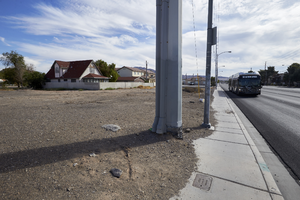
Bus and housing along East Sahara Avenue at Arden Street, looking east, Las Vegas, Nevada: digital photograph
Date
2017-09-26
Archival Collection
Description
A bus traveling on East Sahara Avenue near Arden Street passes a vacant lot and single family housing.
Image
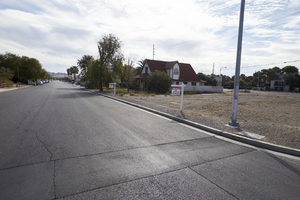
Single family home lots for sale off East Sahara Avenue east of Lamb Boulevard, looking east, Las Vegas, Nevada: digital photograph
Date
2017-09-26
Archival Collection
Description
For sale signs line Cincinnati Avenue off East Sahara Avenue at Arden Street.
Image
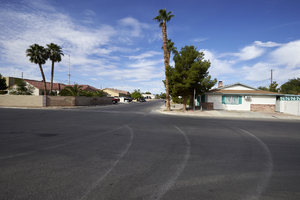
Single Family housing on Cincinnati Avenue at Arden Street, looking west, Las Vegas, Nevada: digital photograph
Date
2017-09-26
Archival Collection
Description
Single family homes line Cincinnati Avenue at Arden Street off East Sahara Avenue east of Lamb Boulevard.
Image
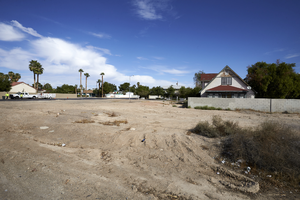
Vacant land and single family homes off East Sahara Avenue east of Lamb Boulevard, looking north, Las Vegas, Nevada: digital photograph
Date
2017-09-26
Archival Collection
Description
Vacant land sits in a single family neighborhood area off East Sahara Avenue and Arden Street.
Image
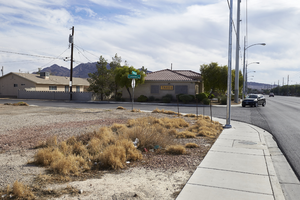
Vacant land at East Sahara Avenue and Lucerne Street, looking east, Las Vegas, Nevada: digital photograph
Date
2017-09-26
Archival Collection
Description
Vacant land sits on the northwest corner of East Sahara Avenue and Lucerne Street. The neighborhood is a mix of commercial land next to Sahara next to single family development to the north.
Image
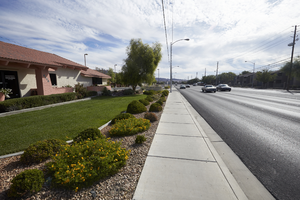
A commercial property on East Sahara Avenue east of Lucerne Street, looking east, Las Vegas, Nevada: digital photograph
Date
2017-09-26
Archival Collection
Description
A commercial property sits along East Sahara Avenue east of Lucerne Street as car pass by.
Image
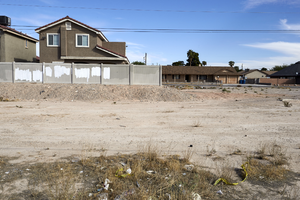
Vacant land and single family housing off East Sahara Avenue east of Lamont Street, looking north, Las Vegas, Nevada: digital photograph
Date
2017-09-26
Archival Collection
Description
Vacant land shares a wall with single family homes off East Sahara Avenue east of Lamont Street.
Image
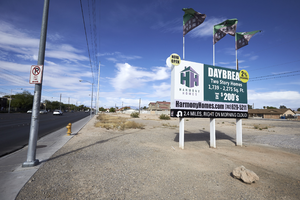
New home advertisement on East Sahara Avenue at Frank Street, looking west, Las Vegas, Nevada: digital photograph
Date
2017-09-26
Archival Collection
Description
A billboard advertising a new home development sits along East Sahara Avenue at Frank Street.
Image
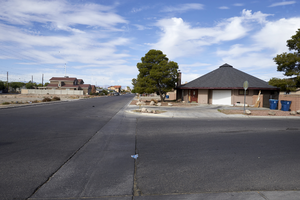
Single family housing on Cincinnati Avenue off East Sahara Avenue at Frank Street, looking west, Las Vegas, Nevada: digital photograph
Date
2017-09-26
Archival Collection
Description
The single family home neighborhood on Cincinnati Avenue as seen from Frank Street. The strip of land closest to East Sahara Avenue is commercial, whereas single family housing dominates immediately to the north.
Image
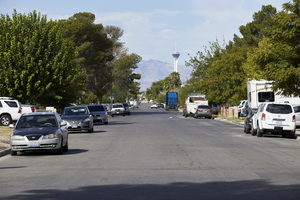
Welter Avenue looking west towards the Stratosphere Tower, Las Vegas, Nevada: digital photograph
Date
2017-09-26
Archival Collection
Description
The Stratosphere Tower can be seen in the background of this image of Welter Avenue, north of East Sahara Avenue at Frank Street.
Image
Pagination
Refine my results
Content Type
Creator or Contributor
Subject
Archival Collection
Digital Project
Resource Type
Year
Material Type
Place
Language
Records Classification
